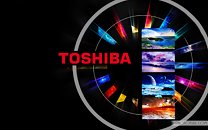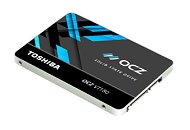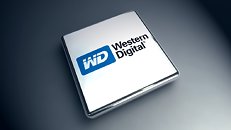Raevenlord
News Editor
- Joined
- Aug 12, 2016
- Messages
- 3,755 (1.19/day)
- Location
- Portugal
| System Name | The Ryzening |
|---|---|
| Processor | AMD Ryzen 9 5900X |
| Motherboard | MSI X570 MAG TOMAHAWK |
| Cooling | Lian Li Galahad 360mm AIO |
| Memory | 32 GB G.Skill Trident Z F4-3733 (4x 8 GB) |
| Video Card(s) | Gigabyte RTX 3070 Ti |
| Storage | Boot: Transcend MTE220S 2TB, Kintson A2000 1TB, Seagate Firewolf Pro 14 TB |
| Display(s) | Acer Nitro VG270UP (1440p 144 Hz IPS) |
| Case | Lian Li O11DX Dynamic White |
| Audio Device(s) | iFi Audio Zen DAC |
| Power Supply | Seasonic Focus+ 750 W |
| Mouse | Cooler Master Masterkeys Lite L |
| Keyboard | Cooler Master Masterkeys Lite L |
| Software | Windows 10 x64 |
After some reports pegged this event has likely and upcoming, Toshiba has now confirmed that they will be spinning off their NAND production business, whilst simultaneously parting with a 20% minority stake on the resulting business. This would inject Toshiba's coffers with enough liquidity to keep the company afloat, whilst letting them keep a hold of their most profitable business.
While details are still scarce (namely regarding the structuring of this spin off and who will be the investor to buy the reported 20% stake that Toshiba is willing to part with (with it most likely being Western Digital, as we've mentioned in our previous piece), the company has announced that they want to complete the transaction by the end of this quarter, March 31st.



For Toshiba, NAND flash production is strategically important because it enables the company to produce all types of storage devices in-house, allowing it to keep total production verticality, since product development, inception and design, all the way towards parts manufacturing and assembly - which leads to higher margins on each product sold.
The only other company that can manufacture all types of storage products using its own media is Western Digital, which already has working relations, in the form of joint ventures, with Toshiba. As such, Western Digital would be the perfect investor, since it already has everything needed (from infrastructure, production and quality assurance to channel partners) to produce actual storage devices.
According to Reuters, sources have said Toshiba aims to raise more than 200 billion yen ($1.7 billion) from the sale: with other potential investors including private equity firms and the government-backed Development Bank of Japan.
Though it has to be said: selling of your most profitable business may be a short-term need, but it's surely a long-term risk. Mark Newman, an analyst at Sanford Bernstein in Hong Kong, reiterated the fact that such moves are usually met with long-term hurdles that may help to sink the company even more, by saying that "The NAND business is the only one with value, as it makes up all of the semi-conductor profits, which comprise 75 percent of the overall company's profit. I won't be surprised if they sell another 20 percent in a few years time and then another 20 percent.".
The other most recognizable spin off in recent years has been AMD's spin off of their manufacturing business and the creation of Globalfoundries. The verdict is still up in the air regarding that business decision, with AMD still incurring regular penalties and charges that they would otherwise be free of (though it would appear, looking only towards the company's recent history, that it is now paying off).
We'll just have to wait and see how this turns out, but this might mean that Western Digital will become even more of a juggernaut in NAND production - and we all know what happens when one company has the leverage on any given market, even if it isn't, in the legal sense of the word, a monopoly.
View at TechPowerUp Main Site
While details are still scarce (namely regarding the structuring of this spin off and who will be the investor to buy the reported 20% stake that Toshiba is willing to part with (with it most likely being Western Digital, as we've mentioned in our previous piece), the company has announced that they want to complete the transaction by the end of this quarter, March 31st.



For Toshiba, NAND flash production is strategically important because it enables the company to produce all types of storage devices in-house, allowing it to keep total production verticality, since product development, inception and design, all the way towards parts manufacturing and assembly - which leads to higher margins on each product sold.
The only other company that can manufacture all types of storage products using its own media is Western Digital, which already has working relations, in the form of joint ventures, with Toshiba. As such, Western Digital would be the perfect investor, since it already has everything needed (from infrastructure, production and quality assurance to channel partners) to produce actual storage devices.
According to Reuters, sources have said Toshiba aims to raise more than 200 billion yen ($1.7 billion) from the sale: with other potential investors including private equity firms and the government-backed Development Bank of Japan.
Though it has to be said: selling of your most profitable business may be a short-term need, but it's surely a long-term risk. Mark Newman, an analyst at Sanford Bernstein in Hong Kong, reiterated the fact that such moves are usually met with long-term hurdles that may help to sink the company even more, by saying that "The NAND business is the only one with value, as it makes up all of the semi-conductor profits, which comprise 75 percent of the overall company's profit. I won't be surprised if they sell another 20 percent in a few years time and then another 20 percent.".
The other most recognizable spin off in recent years has been AMD's spin off of their manufacturing business and the creation of Globalfoundries. The verdict is still up in the air regarding that business decision, with AMD still incurring regular penalties and charges that they would otherwise be free of (though it would appear, looking only towards the company's recent history, that it is now paying off).
We'll just have to wait and see how this turns out, but this might mean that Western Digital will become even more of a juggernaut in NAND production - and we all know what happens when one company has the leverage on any given market, even if it isn't, in the legal sense of the word, a monopoly.
View at TechPowerUp Main Site
Last edited:


